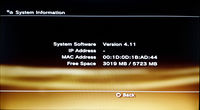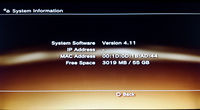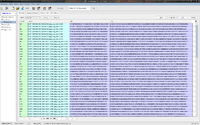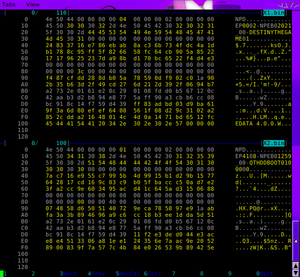User talk:Masterzorag: Difference between revisions
Masterzorag (talk | contribs) mNo edit summary |
m (→questions) |
||
| Line 422: | Line 422: | ||
_EndOfReply_<br /><br /> | _EndOfReply_<br /><br /> | ||
_Reply for reply_<br /> | |||
1. metadata length = 0 bytes for both files, so digest for empty message is DA39A3EE5E6B4B0D3255BFEF95601890AFD80709. | |||
2. r,s validated and valid of course. so you can use make_npdata the newest version for validate signatures into edats. there are no mistakes, it is realy ecdsa sig. | |||
3. Both signatures has 40 bytes, first 20 bytes is R , second 20 bytes is S. | |||
irc: #ps3hax, #playstationhax | irc: #ps3hax, #playstationhax | ||
Revision as of 15:04, 16 October 2014
As far as I know, I'm the only coding OpenCL on the Cell here, if someone want to test something be warned that due some spufs changes that ppc-kernel-devs are (maybe) trying to fix, latest 3.3/3.4/3.5 branches falls into 'possible circular locking dependency detected' and slowdown runtime.
- It's stable until 3.2 branch.
- Even disabling lock debugging it slowdowns without warnings, it happens even with OpenCL samples from IBM.
http://permalink.gmane.org/gmane.linux.ports.ppc.embedded/50547
Latest tested kernels:
- 3.2.55 works fine
# ./perlin OpenCL took 22.496168 seconds to compute 1000 frames. Pixel Rate = 46.611316 Mpixels/sec, Frame Rate = 44.452015 frames/sec Host code took 12.620616 seconds to compute 10 frames. Pixel Rate = 0.830844 Mpixels/sec, Frame Rate = 0.792354 frames/sec OpenCL provided a 56.101182 speedup
- 3.3.3/3.4.6/3.5.3 falls into 'possible circular locking dependency detected' and slowdown runtime
Here the slowdown effect:
# ./perlin OpenCL took 93.280273 seconds to compute 1000 frames. Pixel Rate = 11.241133 Mpixels/sec, Frame Rate = 10.720380 frames/sec Host code took 12.948244 seconds to compute 10 frames. Pixel Rate = 0.809821 Mpixels/sec, Frame Rate = 0.772305 frames/sec OpenCL provided a 13.881010 speedup
In this specific case time spent is 4x to do the same thing!
When program runs something is going weird, e.g. in my program I'm used to query an OpenCL builtin function to tell me how many available SPEs there are, and its reply 8.
Using spu_base.enum_shared=1 parameter it should reply 7, so seems that the issue is OpenCL related.
OtherOS region
OtherOS/OtherOS++ region is on HDD (ps3dd), we have new linux tools (ps3sed) and drivers.
To resize ps3da I've tried new ps3sed (manually), unsuccesfully: GameOS always detect corruption and redo its own things.
I've found a way to force resize on 4.46, no emer_init patch, no downgrading: GameOS respect standards.
I can now resize ps3da at arbitrary size.
Swapping HDD on pc is necessary to me to send a couple to SET MAX ADDRESS ata commands to get the job done: set the limit, left GameOS (partition and) format, then reset size back the same way.
On boot all regions are fine, plus empty space as tail, nice to fit a fouth region.
Here I've forced ps3da to use 1216709344 sectors, this left me about 16G for ps3dd.
After that GameOS do it own things, I've resetted ps3da to its real geometry (1250263728) and booted a new petitboot.
root@ps3-linux:~# dmesg | grep ps3disk [ 3.220526] ps3disk_init:601: registered block device major 254 [ 3.220549] ps3_system_bus_match:369: dev=6.0(sb_04), drv=6.0(ps3disk): match [ 3.220856] ps3disk sb_04: accessible region 0 start 0 size 1250263728 [ 3.220952] ps3disk sb_04: accessible region 1 start 32 size 1212515008 [ 3.221045] ps3disk sb_04: accessible region 2 start 1212515040 size 4194296 [ 3.221051] ps3disk sb_04: ps3stor_probe_access:133: 3 accessible regions found [ 3.227341] ps3disk sb_04: ps3da is a SAMSUNG HM641JI (610480 MiB total, 610480 MiB region) [ 3.229035] ps3disk sb_04: ps3db is a SAMSUNG HM641JI (610480 MiB total, 592048 MiB region) [ 3.230008] ps3disk sb_04: ps3dc is a SAMSUNG HM641JI (610480 MiB total, 2047 MiB region) root@ps3-linux:~# ps3sed print_region 3 0 0 1250263728 1 1 32 1212515008 8 2 1212515040 4194296 8 root@ps3-linux:~# create_hdd_region.sh INFO: device id 3 INFO: number of regions 3 INFO: total number of blocks 1250263728 INFO: last region start block 1212515040 INFO: last region number of blocks 4194296 INFO: new region start block 1216709344 INFO: new region number of blocks 33554376 INFO: new region id 3 root@ps3-linux:~# ps3sed print_region 3 0 0 1250263728 1 1 32 1212515008 8 2 1212515040 4194296 8 3 1216709344 33554376 1 root@ps3-linux:~# reboot && exit
Last number 1 is wrong, it says that last region has only one acl entry, we need to fix it at 8 entries:
- manually with ps3sed
- rebooting
Petitboot finally detect a new ps3dd device, the fourth region, of (33554376 * 512 =) 17179840512 bytes.
All of this with a 3.10.26 kernel and new tools: no vflash hacking involved, linux on vflash7 is deprecated.
Sometimes HDD is reported as second device (something buggy in my kernel?):
root@ps3-linux:~# ps3sed print_device
flash 1 512 491008 7
cdrom 3 2048 2147483647 1
disk 2 512 1250263728 4
00000000 00 00 00 00 00 00 00 00 00 00 00 00 00 00 00 00 |................|
00000010 00 00 00 00 0f ac e0 ff 00 00 00 00 de ad fa ce |................|
00000020 00 00 00 00 00 00 00 03 00 00 00 00 00 00 00 02 |................|
00000030 00 00 00 00 00 00 00 20 00 00 00 00 48 45 82 c0 |....... ....HE..|
00000040 10 70 00 00 02 00 00 01 00 00 00 00 00 00 00 03 |.p..............|
00000050 10 70 00 00 01 00 00 01 00 00 00 00 00 00 00 03 |.p..............|
00000060 10 20 00 00 03 00 00 01 00 00 00 00 00 00 00 03 |. ..............|
00000070 00 00 00 00 00 00 00 00 00 00 00 00 00 00 00 00 |................|
*
000000c0 00 00 00 00 48 45 82 e0 00 00 00 00 00 3f ff f8 |....HE.......?..|
000000d0 10 70 00 00 02 00 00 01 00 00 00 00 00 00 00 03 |.p..............|
000000e0 10 70 00 00 01 00 00 01 00 00 00 00 00 00 00 03 |.p..............|
000000f0 00 00 00 00 00 00 00 00 00 00 00 00 00 00 00 00 |................|
*
00000150 00 00 00 00 48 85 82 e0 00 00 00 00 01 ff ff c8 |....H...........|
00000160 10 70 00 00 02 00 00 01 00 00 00 00 00 00 00 03 |.p..............|
00000170 00 00 00 00 00 00 00 00 00 00 00 00 00 00 00 00 |................|
*
00000400
Another test on a different, not hacked PS3, running GameOS 4.11
ST96812AS is a 117210240 sectors of 512 bytes each, original PS3 60Gb HDD: here I've limited to 1/10, but I can force every size.
GameOS (must) accept it.
ps3vuart-tools
We miss some stuff from old ps3sm-utils, looking to port: temperature, get_fan_policy and set_fan_policy to new ps3vuart-tools.
We need to enable some sort of fan control on petitboot now.
root@fedora_clone ~]# /home/ps3vuart-tools-2012-09-01/ps3sm/ps3sm get_fan_policy 0 0x01 0x01 0x48 0x00 [root@fedora_clone ~]# /home/ps3vuart-tools-2012-09-01/ps3sm/ps3sm temperature 0 01 00 00 00 3f 49 00 00
Updating the Real Time Clock with hwclock results in error:
Mar 31 18:09:18 fedora_clone kernel: os_area_queue_work_handler: Could not update FLASH ROM
UPL.xml.pkg
tar -t -f update_files.tar ls UPL.xml.unpkg/ -rw-r--r-- 1 0 0 2.8K Jun 27 13:40 content -rw-r--r-- 1 0 0 64 Jun 27 13:40 info0 -rw-r--r-- 1 0 0 64 Jun 27 13:40 info1 ... -rwxr-xr-x 1 0 0 640 Jun 27 15:20 UPL.xml.pkg.spkg_hdr.1 UPL.xml.unpkg/content: XML document text UPL.xml.unpkg/info0: data UPL.xml.unpkg/info1: data UPL.xml.unpkg/UPL.xml.pkg.spkg_hdr.1: data
scetool -v -i update_files.untar/UPL.xml.pkg [*] Using keyset [pkg 0x0000 03.55] [*] Header decrypted. [*] Data decrypted. [*] SCE Header: Magic 0x53434500 [OK] Version 0x00000002 Key Revision 0x0000 Header Type [PKG] Metadata Offset 0x00000000 Header Length 0x0000000000000280 Data Length 0x0000000000000B9D // 2973 bytes, content + info0 + info1 [*] Metadata Info: Key 87 EE 46 44 60 DA DA EA 49 74 58 F9 02 1D 6D 11 IV F4 9F 43 D8 D0 6A F0 FC 33 AF 5E 6E CF 2F 30 1E [*] Metadata Header: Signature Input Length 0x0000000000000250 unknown_0 0x00000001 Section Count 0x00000003 Key Count 0x00000014 Optional Header Size 0x00000000 unknown_1 0x00000000 unknown_2 0x00000000 [*] Metadata Section Headers: Idx Offset Size Type Index Hashed SHA1 Encrypted Key IV Compressed 000 00000280 00000040 01 01 [YES] 00 [NO ] -- -- [NO ] 001 000002C0 00000040 02 02 [YES] 06 [NO ] -- -- [NO ] 002 00000300 0000016B 03 03 [YES] 0C [YES] 12 13 [YES] [*] SCE File Keys: n 14
hexdump -C UPL.xml.pkg
00000280 00 00 00 03 00 00 00 04 00 00 00 00 00 00 00 0a |................| 00000290 20 14 06 19 01 15 45 00 00 00 00 00 00 00 0b 1d | .....E.........| 000002a0 00 00 00 00 00 00 01 6b 00 00 00 00 00 00 00 00 |.......k........| 000002b0 00 00 00 00 00 00 00 00 00 00 00 00 00 00 00 00 |................| 000002c0 00 00 00 00 00 00 00 03 00 00 00 00 00 00 00 40 |...............@| 000002d0 00 00 00 00 00 00 00 00 00 00 00 00 00 00 0b 1d |................| 000002e0 00 00 00 00 00 00 00 01 00 00 00 00 00 00 00 01 |................| 000002f0 00 00 00 00 00 00 00 00 00 00 00 00 00 00 00 00 |................| We got info0 + info1, 64bytes each content is 2845bytes, total is data lenght 2973 info0, info1 are not encrypted
UPL.xml.pkg is decrypted using pkg keyset [0x0000 03.55], UPL.xml.pkg.spkg_hdr.1 is decrypted using spkg keyset for > 3.55: only Metadata Info and Signature changes.
I think that on 3.55 all .spkg_hdr.1 files are not involved in updating, on 3.56 all of them are used as in overlayfs, so all .spkg_hdr.1 files are readed as metadata headers, decrypted by newer spkg keyset to get the same SCE keys to get rest of data decrypted.
- https://www.certicom.com/index.php/20-elliptic-curve-groups-over-real-numbers
- http://csrc.nist.gov/groups/ST/key_mgmt/documents/June09_Presentations/rene.struik.KMWJune09_5Min.pdf
- http://cacr.uwaterloo.ca/techreports/2005/cacr2005-28.pdf
- http://stackoverflow.com/questions/20266368/ecdsa-signature-size-too-long
.spkg_hdr.1 decryption
Verifing decryption of signed pkg headers with openssl:
- strip metadata info
# dd if=CORE_OS_PACKAGE.pkg.spkg_hdr.1 of=metainfo.crypt skip=32 count=64 bs=1
64+0 records in
64+0 records out
64 bytes (64 B) copied, 0.0021009 s, 30.5 kB/s
# hexdump -C metainfo.crypt
00000000 d7 f9 82 9e 75 0a 3f 20 8b 6f e7 41 b1 bb 52 15 |....u.? .o.A..R.|
00000010 e1 8f d2 86 43 b5 4f 56 4c 42 a0 10 e1 1a 25 38 |....C.OVLB....%8|
00000020 9c 28 c7 fd 38 31 24 3b 1b 2b 9f 3f dc 72 4f c4 |.(..81$;.+.?.rO.|
00000030 95 34 b8 0a af 25 a1 05 b6 8f ce 2c 88 e9 2b 7b |.4...%.....,..+{|
- verify metadata info decryption with standard tool
# openssl enc -d -aes-256-cbc -in metainfo.crypt -K erk -iv riv | hexdump -C 00000000 7c f2 9a 4b 96 de 5f 75 a1 32 87 c0 42 ec 8f cf ||..K.._u.2..B...| Key 00000010 00 00 00 00 00 00 00 00 00 00 00 00 00 00 00 00 |................| 00000020 6f 85 6a 60 2a 8d b4 3f 2a 81 1b 1a 9c a3 02 f6 |o.j`*..?*.......| IV 00000030
- strip rest of crypted metadata
# dd if=CORE_OS_PACKAGE.pkg.spkg_hdr.1 of=metarest.crypt skip=96 bs=1 544+0 records in 544+0 records out 544 bytes (544 B) copied, 0.00626423 s, 86.8 kB/s
- decrypt rest of metadata
# openssl enc -d -aes-128-ctr -in metarest.crypt -K Key -iv IV | hexdump -C 00000000 00 00 00 00 00 00 02 50 00 00 00 01 00 00 00 03 |.......P........| mh 00000010 00 00 00 14 00 00 00 00 00 00 00 00 00 00 00 00 |................| 00000020 00 00 00 00 00 00 02 80 00 00 00 00 00 00 00 40 |...............@| m_sh0 00000030 00 00 00 01 00 00 00 01 00 00 00 02 00 00 00 00 |................| 00000040 00 00 00 01 ff ff ff ff ff ff ff ff 00 00 00 01 |................| 00000050 00 00 00 00 00 00 02 c0 00 00 00 00 00 00 00 40 |...............@| m_sh1 00000060 00 00 00 02 00 00 00 02 00 00 00 02 00 00 00 06 |................| 00000070 00 00 00 01 ff ff ff ff ff ff ff ff 00 00 00 01 |................| 00000080 00 00 00 00 00 00 03 00 00 00 00 00 00 5a 01 74 |.............Z.t| m_sh2 00000090 00 00 00 03 00 00 00 03 00 00 00 02 00 00 00 0c |................| 000000a0 00 00 00 03 00 00 00 12 00 00 00 13 00 00 00 02 |................| 000000b0 fd 5e fe 3f a0 42 fe 31 d6 61 83 26 98 07 ce e8 |.^.?.B.1.a.&....| h0 0x20, HMAC-SHA1 000000c0 09 a7 65 7a 00 00 00 00 00 00 00 00 00 00 00 00 |..ez............| 000000d0 6a 49 08 b2 87 ee 02 65 8c 73 5a 4c 54 f8 bf 5d |jI.....e.sZLT..]| k0 0x40, HMAC key 000000e0 b6 3a d4 ef d3 94 74 f5 f3 a3 f2 ad af 1c 45 4e |.:....t.......EN| 000000f0 08 aa 2b 61 fb 91 52 9d 69 a8 44 b0 a0 dd 39 1c |..+a..R.i.D...9.| 00000100 bc 4d a0 51 ed f5 30 16 d1 35 8c b1 d1 09 54 d0 |.M.Q..0..5....T.| 00000110 60 32 ff 1c 3d 1a 9d 03 61 28 d8 ad 1f dc 34 57 |`2..=...a(....4W| h1 0x20, HMAC-SHA1 00000120 05 2a 1e f6 00 00 00 00 00 00 00 00 00 00 00 00 |.*..............| 00000130 6a 49 08 b2 87 ee 02 65 8c 73 5a 4c 54 f8 bf 5d |jI.....e.sZLT..]| k1 0x40, HMAC key 00000140 b6 3a d4 ef d3 94 74 f5 f3 a3 f2 ad af 1c 45 4e |.:....t.......EN| 00000150 08 aa 2b 61 fb 91 52 9d 69 a8 44 b0 a0 dd 39 1c |..+a..R.i.D...9.| 00000160 bc 4d a0 51 ed f5 30 16 d1 35 8c b1 d1 09 54 d0 |.M.Q..0..5....T.| 00000170 3c 37 73 07 73 d5 69 69 52 67 97 3b e9 20 70 a9 |<7s.s.iiRg.;. p.| h2 0x20, HMAC-SHA1 00000180 53 a7 11 6d 00 00 00 00 00 00 00 00 00 00 00 00 |S..m............| 00000190 6a 49 08 b2 87 ee 02 65 8c 73 5a 4c 54 f8 bf 5d |jI.....e.sZLT..]| k2 0x40, HMAC key 000001a0 b6 3a d4 ef d3 94 74 f5 f3 a3 f2 ad af 1c 45 4e |.:....t.......EN| 000001b0 08 aa 2b 61 fb 91 52 9d 69 a8 44 b0 a0 dd 39 1c |..+a..R.i.D...9.| 000001c0 bc 4d a0 51 ed f5 30 16 d1 35 8c b1 d1 09 54 d0 |.M.Q..0..5....T.| 000001d0 35 53 b4 b5 44 28 fe 09 5a 04 e5 38 e8 38 f4 a6 |5S..D(..Z..8.8..| Key 000001e0 5d 24 fa b1 e0 55 f4 58 15 22 c2 73 00 00 00 00 |]$...U.X.".s....| IV 000001f0 00 c9 57 08 f1 6f e6 75 39 6f 2a 12 51 48 5f 8c |..W..o.u9o*.QH_.| r, s 00000200 97 53 e3 e2 a7 00 b7 47 fa c2 0b 01 2b df 5a 34 |.S.....G....+.Z4| 00000210 f7 a8 d0 21 d2 f8 94 4b 6e 30 00 00 00 00 00 00 |...!...Kn0......|
verify ecdsa signatures
- get signature
- join sceh + decrypted metadata info + decrypted rest of metadata until signature
# ls -l metadata.bin -rw-r--r-- 1 root root 592 Jul 11 metadata.bin
- compute digest of the whole decrypted metadata until signature
# sha1sum metadata.bin 70942107d35df85091bf4949d7fa46421e27d056 metadata.bin
- verify signature against computed digest
ecdsa_verify(digest, r, s) == 1
collecting spkg_hdr.1 signatures
I've started collecting into an SQLite database all publicily available ECDSA signatures from spkg.hdr.1 files, to research.
Note that here I've named 3.57 the 3.56#2 one! I know, 3.57 doesn't exist.
- get spkg_hdr.tar file from PS3UPDAT.PUP, here I've just added an argument to pupunpack to extract only the needed section:
ps3tools # ./pupunpack ../PS3\ 3.56\ OFW/PS3UPDAT.PUP ../PS3\ 3.56\ OFW/unpacked 7 sections: 9 hdr size: 00000000_00000290 data size: 00000000_0b0f3d3d header hmac: OK extracting only section 7 section 7: unpacking spkg_hdr.tar (00000000_00011800 bytes; hmac: OK)...
- untar spkg.hdr.1 files
# cd ../PS3\ 3.56\ OFW/unpacked/ unpacked # tar -xf spkg_hdr.tar
- strip signature data off spkg.hdr.1 files into spkg.hdr.1_sigdata files, here I've added a function to sceverify
unpacked # for file in *hdr.1; do ../../ps3tools/sceverify $file; done ... hash: c72f26e67e03b743a8c830a541e82bfb2e9f6c19 r: 0056af2dad5647288c75e76dc92ed875de86876d7e s: 00d7de25130de0f6dc0602e590b42bc5f21ab2a3e6 Signature: ecdsa_verify(hash, r, s) : OK Collecting digest + signature for file: UPL.xml.pkg.spkg_hdr.1 exported: UPL.xml.pkg.spkg_hdr.1_sigdata, recheck ecdsa signature: OK
unpacked # for file in *1_sigdata; do ls -h $file; done BDIT_FIRMWARE_PACKAGE.pkg.spkg_hdr.1_sigdata BDPT_FIRMWARE_PACKAGE_301R.pkg.spkg_hdr.1_sigdata BDPT_FIRMWARE_PACKAGE_302R.pkg.spkg_hdr.1_sigdata ...
- collect sigdata into an sqlite database, I've coded an app to do the job:
unpacked # for file in *1_sigdata; do ../../ps3tools/collector 1 $file 3.56; done Connection successful BDIT_FIRMWARE_PACKAGE.pkg.spkg_hdr.1_sigdata BDIT_FIRMWARE_PACKAGE.pkg.spkg_hdr.1 3.56 dig = 749e7ba6fba9ff4c8ad83d1fd62feec4ea9ad3f2 sig = 00574c57e9ceaac1285b3f6d7b06feaa7daa180edf002b0cc8548f42c523afa39c6984e4b67b9639afbc ... BDPT_FIRMWARE_PACKAGE_301R.pkg.spkg_hdr.1_sigdata BDPT_FIRMWARE_PACKAGE_301R.pkg.spkg_hdr.1 3.56 dig = cee76eb85bf899952acc8723ef3e35fdc9b0da23 sig = 0001bd4af80d5e8f190baea58e6613e5672d1c29a8000dcfad27f4edcef9f0b9f000759d89ebb050d871 ...
- since collector can also export to STDOUT, we can already filter, sort...
# ./ps3tools/collector 2 | head -12 Connection successful Export to STDOUT BDIT_FIRMWARE_PACKAGE.pkg.spkg_hdr.1 3.57 dig = fcde1eaf97e24c9d0a5fe2af312e5b1ce1e6ab14 r = 003798ace6c2097c02e2f9214bfc2bbf5c7bd347ae s = 002b1a77b56e0995f80761fa779db5b09e269ebf96 BDPT_FIRMWARE_PACKAGE_301R.pkg.spkg_hdr.1 3.57 dig = 0d953e1f78195b960a145a0c20753269a2352204 r = 00b2a103abbf09db35eb5a2580554446255fee4504 s = 0061292680dccc79e92373f002e669cf238c520a70 # ./ps3tools/collector 2 | grep "r =" | sort | head r = 000119f11cc9076d039c1c0a625afe3dc5f9e38af9 r = 000171cfd17643b35e3f7a9fa1d64398413c35a949 r = 0001bd4af80d5e8f190baea58e6613e5672d1c29a8 r = 00023c6b278121e57ae6c836c0a188344dc676f9b7 r = 0003c42810e1b9f3cc4a93e71b101359116c06e68a r = 000418380d9e2d2f4a11e88bcb42af8f17b042cd31 r = 00049a30c5e2d38ad19765e6c02e94377bf93444f9 r = 0004fa6eb1641706c20a14ede5dc0fe497b01f4dee r = 00051b73b3eea4904f899ffc10f445ee080f2f3912 r = 0005639f0f3dd5585ed5e64df0421b274e842a2a2f
- check for the same r (they just failed in this, but watch how is simple!)
# ./ps3tools/collector 2 | grep "r =" | sort | wc -l 298 lines # ./ps3tools/collector 2 | grep "r =" | sort | uniq | wc -l 298 lines (no same r!)
- database can be accessed via SQL query too, it contains binary blobs
# sqlite3 /tmp/collector_db.sqlite3 SQLite version 3.8.5 2014-06-04 14:06:34 Enter ".help" for usage hints. sqlite> SELECT HEX(dig) FROM spkg_hdr WHERE name = "SYS_CON_FIRMWARE_01010303.pkg.spkg_hdr.1 3.70"; 7215D87859A31889F5FB931BDED988A95AF6A38E
- we can just use a browser plugin to deal with database
questions
why you collect these hashes and signatures?
Now if 2 digests are different then R signatures would be diffenet too. Pseudo Random number (that used to creating signature) now is F(digest);
If digests are same then Pseudo Random numbers are same too ->> R sigs would be same and S sigs would be same.
For every digest, we have 1 and only 1 signature (R,S). If you want obtain private key, you need to find an algorithm for generating pseudo random number from the digest.
_Reply_
ECDSA signature is the (r, s) keypair:
http://en.wikipedia.org/wiki/Elliptic_Curve_Digital_Signature_Algorithm#Signature_generation_algorithm
- first part, r
to compute r you have to (3) select a random integer, (4) calculate the curve point first, to finally (5) take the x coordinate mod n.
- the random integer
that random integer in signature generation is equal to select the random integer in the priv/pub keypair generation.
that number is the temporary or ephemeral key.
for every signature the algorithm needs one random integer, that must be never reselected, else epic fail.
- digest
hash function is SHA1, you know, collision resistant: we can "never" have two different messages that produces the same sha1sum, else a collision.
they also uses metadata info to change the message to sign from .pkg to .spgk_hdr.1 files, else they signs the same digest with different curve. (who other noticed/know this?)
- second part, s
s is computed from the digest and the latter r.
- why
suppose that you are doing trial point multiplication (x) computing: p = k x G to guess for the correct k that had produced our public point p.
instead of checking only for exactly p, the pub, now you can consider that you have some hundreds of correct/public x coordinate mod n to check/guess for.
or, in other words: I can luckily select an integer that, even isn't the priv, is the ephemeral key that had produced a valid signature.
what could happen if I get an ephemeral key?
- those two needs investigation
1. For every digest, we have 1 and only 1 signature (R,S).
Sorry , but don't think so, because as you can have read, r comes from a random number. (I'll check)
2. Pseudo Random number (that used to creating signature) now is F(digest);
They can't be so idiots, since digest is ever known...
_EndOfReply_
- So I will show for you that R = Function(digest) and what this fail is not so critical.
I was interested for edat algorithm and figured out how edats (and sdat) files are signed.
It contains 2 non-randomfailed ecdsa signatures. http://www.psdevwiki.com/ps3/EDAT_files#Structure_.28Encrypted_Format.29
first one is metadata signature and the second one is header signature. There are some edat files created from data files with 0 byte length, that contains metadata with 0 byte length.
There are examples: original pkg links: http://is.gd/naLaxh , http://is.gd/IFtWmq it contains destiny.edat and hdd_package_key.edat , both files have metadata with 0 byte length.
Hex code of the edats: http://pastie.org/private/ejoloa5qjjy8wlkezadga , http://pastie.org/private/fbr9uphpjzm0xd4gqfuyg .
So Both edats have metadata digiest = DA39A3EE5E6B4B0D3255BFEF95601890AFD80709 , R = A2732E0161E20C290108FDD0B567120C42AAB3D2 , S = B894E8775AFF90A3CBB6CC08BC918C14F759D439
So if digests are same then pseudo_random_numbers are same and signatures are same.
Please make your conclusions.
_Reply_
You have already seen differences between two files, but maybe some other not. Here a png.
First of all, that wiki page have a lot of "?", so something can be (really) different from what I've read.
Page is telling me that at 0xB0 there is an ECDSA signature, and you are pointing out that we have the same (ECDSA) signature on two different files !?!
1. I see your "same signature", but how do you get "metadata digest = DA39A3EE5E6B4B0D3255BFEF95601890AFD80709" from both?
2. Conclusion to me are that at 0xB0 there is not an ECDSA signature, so: have you checked? Have you validated? Have you proven that r, s is the valid signature for the digest?
3. There is also another aspect to not forget: alignment (%16 = 0), so there is an ECDSA signature in 40 bytes? does not sound good to me...
4. SHA-1 produces a fixed lenght of 20 bytes: at wiki page I read "0x40 QA digest, size 0x10 (seems like to be a SHA-1 hash of the non-finalized file) ... Can be ... zeroed on forged file." !?!
5. There are two ECDSA signatures on an EDAT file and only one to protect CORE_OS_PACKAGE.pkg from alteration !?!?!
_EndOfReply_
_Reply for reply_
1. metadata length = 0 bytes for both files, so digest for empty message is DA39A3EE5E6B4B0D3255BFEF95601890AFD80709.
2. r,s validated and valid of course. so you can use make_npdata the newest version for validate signatures into edats. there are no mistakes, it is realy ecdsa sig.
3. Both signatures has 40 bytes, first 20 bytes is R , second 20 bytes is S.
irc: #ps3hax, #playstationhax



